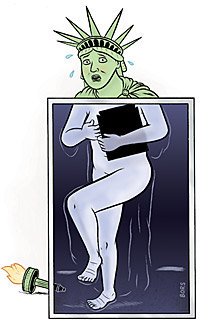
Andy Greenberg at Forbes.com reported yesterday that company representatives told him that backscatter X-rays mounted in vans that can be driven around the public streets have been sold to, and deployed by, domestic U.S. law enforcement agencies.
Backscatter X-rays are one of the technologies that are used in full body scanners at airports (over our strenuous objections). They can see through clothing and reveal the naked human form.
We don't know exactly how government purchasers of these vans are using them, but if they are in fact being used on public streets, that would be a major violation of the Constitution. In fact, it's hard to believe that any counsel at any government agency would sign off on allowing these vans to be used in that way.
Greenberg writes:
American Science & Engineering, a company based in Billerica, Massachusetts, has sold U.S. and foreign government agencies more than 500 backscatter x-ray scanners mounted in vans that can be driven past neighboring vehicles to see their contents, Joe Reiss, a vice president of marketing at the company told me in an interview. While the biggest buyer of AS&E's machines over the last seven years has been the Department of Defense operations in Afghanistan and Iraq, Reiss says law enforcement agencies have also deployed the vans to search for vehicle-based bombs in the U.S.
The use of this technology constitutes a search, and under the Fourth Amendment, a search can only be carried out with a warrant. There are exceptions to that, but none of them would apply if this technology is being used on public streets:
- The courts have ruled that motor vehicles can be searched by police officers without a warrant — but only when those officers have probable cause to believe that the vehicle contains evidence or contraband. That is the same standard required to get a warrant (the only difference is that the officer does not have to get the prior approval of a judge).
- In addition, to the extent that these devices provide scans of individuals (in vehicles or on the street), then even the motor vehicle exception would not apply.
- The courts have ruled that the government can carry out intrusive "administrative" searches on airline passengers, strictly for the narrow purpose of protecting the safety of aircraft. Clearly not applicable here.
- Searches are also conducted at government buildings and some other venues, but again those are carried out for a specific protective purpose, are usually voluntary, and are done with the knowledge and cooperation of the subject, who can therefore prepare for the search to minimize the invasion of privacy involved. Conducting such searches without full disclosure would certainly be unacceptable from a privacy standpoint.
Another major exception to the Fourth Amendment is at the nation's borders, where individuals have reduced (but not zero!) rights of privacy. Again that would not be relevant to internal use. The Department of Homeland Security is, in fact, working on deploying vehicle-scale backscatter X-ray scanners at the borders (as I learned at a briefing I received on this recently) and this may account for some of the units sold to domestic agencies (Customs & Border Patrol is part of DHS). Use of this technology on the border also raises certain concerns, but is a more complicated issue than use on the streets would be.
In addition to the privacy issues involved, it should be noted that backscatter X-ray scanners use radiation. Although the doses are said to be very low, scientists have raised questions about whether they might inadvertently deliver concentrated doses to particular spots on subjects' skin. Concerns have also arisen over the calibration and operation of these machines. Last month, the New York Times reported that more than 400 patients around the country accidentally received serious radiation overdoses from CT scan machines operated by trained medical personnel — enough to cause hair loss, rashes, memory loss, and elevated cancer risk. Do we trust that the government has the proper management and oversight mechanisms to ensure that every one of its roving scanners is working right, calibrated properly, and will not be "cranked up" by operators eager to see ever more detail in the scans they are producing?
Unless they have probable cause to search a specific vehicle, government agencies had better not be roaming U.S. streets conducting backscatter X-ray scans of vehicles and their occupants (much less pedestrians, cyclists, etc.) without their knowledge or consent. The Constitution may have taken a battering in recent years, but on this point it remains clear.



